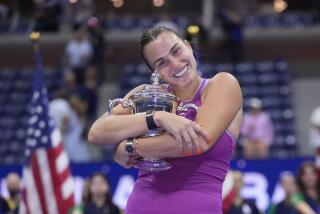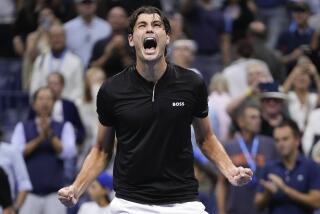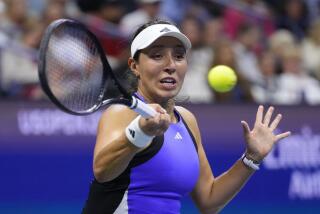U.S. Open Notebook : Graf Arrives--Too Bad It’s on Martina’s Court
NEW YORK — Today’s question of the day at the U.S. Open:
Who is Steffi Graf. . . . and what is she doing hanging out with Chris Evert Lloyd, Martina Navratilova and Hana Mandlikova in the semifinals of the women’s division?
Good question.
Until Wednesday, when she upset Pam Shriver in three tiebreakers, Graf very well may have rated as the best tennis player you’ve never heard of.
And there are reasons for that.
First is Boris Becker. Graf and Becker share the same homeland, and when Becker won Wimbledon, everything else in West Germany was pretty much rendered irrelevant--despite Graf’s sensational summer.
Then there is Gabriela Sabatini. The 15-year-old Argentine has monopolized publicity as the top newcomer to the women’s tour because of her youth, her movie-star looks and her semifinal breakthrough at the French Open. But ranked at No. 11 in the world, just one position behind Sabatini, is Graf, who turned 16 in June.
And guess who checked out of the U.S. Open in the first round while Graf was just getting warmed up for her run through the bottom half of the draw?
Ted Tinling, an observer of women’s tennis for more than 50 years, sees six teen-agers forming the future of the sport--Czechoslovakia’s Helen Kelesi, Bulgaria’s Katerina Maleeva, Mary Joe Fernandez, Melissa Gurney, Sabatini and Graf.
“Of the six,” Tinling says, “Sabatini has the most talent. But Graf will emerge as the top player because of her mental approach. By the third game of the first set, she knows exactly what it takes to win the match.”
Some quick facts about Graf:
--Turned pro in 1982 and became the youngest female player ever to earn a computer ranking when she was No. 214 at 13.
--Won last year’s tennis demonstration at the Olympics. At 15, she was the youngest player in the field.
--Beat Sabatini in their only 1985 meeting, a semifinal match last month at Mahwah, N.J.
--Has qualified for the fourth round or better in each of her last eight tournaments. She reached the final at Mahwah and the German Open, the semifinals at Delray Beach, Fla., and Hilton Head, S.C., the quarterfinals at Amelia Island, S.C., and the fourth round at Wimbledon and the French Open.
Today, she makes her first appearance in the semifinals of a Grand Slam event. Her opponent will be Navratilova, the U.S. Open’s two-time defending champion.
Graf and Navratilova have never played before. Navratilova admits her scouting report on the 5-5 baseliner isn’t extensive.
“I haven’t even played doubles against her,” Navratilova said following her 6-2, 6-3 victory over Zina Garrison. “She’s a baseliner, so I would do pretty much the same as I did against Zina.
“Her serve, I don’t know how good it is or how much I would come in on it. But I would expect the same kind of match, hopefully, that I had against Zina. She’ll probably be more nervous than I am because she’s never been there and it will be all new for her.”
In today’s other women’s semifinal, Lloyd will face Czechoslovakia’s Mandlikova. Past performance would appear to indicate another mismatch.
Lloyd owns an 18-3 career advantage over Mandlikova, having won 14 of their last 15 meetings. In Grand Slam confrontations, Lloyd has a 9-1 edge.
Although Mandlikova has been extended to three sets just once in the first five rounds here, her countrywoman Helena Sukova says Mandlikova will have to raise her play another level to have a chance against Lloyd.
“I think that she’ll have to improve a little more,” Sukova said after losing to Mandlikova in the quarterfinals. “This will be her big chance. She’ll have to play a little better.”
Mandlikova agrees.
“She’s right,” Mandlikova said Tuesday. “I have to serve better. I have to return better. But I have two days to work on it and that’s good.”
As Sukova said, this is Mandlikova’s big chance--to win her first Grand Slam title since 1981 and to shed the “choke” label she has worn since that victory at the French Open.
“I think Hana’s real sensitive about that now,” Lloyd said. “I think she’s a lot more consistent than people give her credit for.”
John McEnroe’s tirade during his men’s quarterfinal victory over Joakim Nystrom Wednesday earned him $1,500 in fines for “verbal abuse.”
The Men’s International Professional Tennis Council fined McEnroe for two violations. One was his dispute over a line call (“a bonehead call,” said McEnroe). The other was a comment made to tournament referee Bob Howe. Arguing about the placement of a courtside television microphone, McEnroe called Howe “an incompetent idiot.”
The fine lifted McEnroe’s total to $6,200 for the year. If he surpasses $7,500--as he did in 1984--McEnroe will draw an automatic suspension.
It could happen here. There are two rounds left.
More to Read
Go beyond the scoreboard
Get the latest on L.A.'s teams in the daily Sports Report newsletter.
You may occasionally receive promotional content from the Los Angeles Times.










